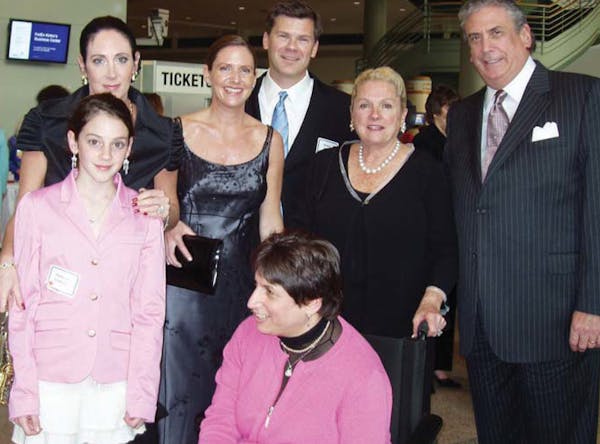Mounting health problems left prominent Twin Cities businessman Irwin Jacobs reflective about his fate and distraught in the weeks before he killed his wife and then himself in their Lake Minnetonka home, his son said.
In an interview Monday, Mark Jacobs said his father, 77, had recently stopped driving because of incapacitating seizures and had been "talking more about his mortality" in recent months. He said his mother, Alexandra, 77, had dementia and orthopedic problems. Irwin Jacobs fatally shot her and then himself in their Orono home on April 10.
Their deaths came with shock and grief, Mark Jacobs said, but he doesn't want his father remembered for his final acts.
"If our lives are 300-page books, this was page 300," the son said. "There was a horrible tragedy, [but] there are 299 other pages in their lives other than this tragedy."
Irwin Jacobs was a well-known and colorful financier whose rise to prominence earned him a reputation in the 1980s as a feared corporate raider. His holdings over the years have included boat maker Genmar, J.R. Watkins of household products fame, as well as a minority slice of the Minnesota Vikings until 1991. His wife enjoyed painting and dedicated her life to raising their five children, according to their joint obituary. Together, they supported many local charities.
Mark Jacobs, so far alone among his siblings to speak publicly since the deaths, said that among family and friends, "there is some anger that he ended things this way."
Then he added, "I feel compassion and sadness that he was suffering so much and covered it up to all of us closest to him."
Irwin Jacobs was thinking more about his mortality, the son said, but that didn't seem out of the ordinary for someone his father's age and coping with medical difficulties.
His heart was failing and he had diabetes, Mark Jacobs said. He suffered a heart attack in the past year and had a stent and a defibrillator implanted. Alexandra Jacobs' dementia was taking an increasing toll on her cognitive abilities and she used a wheelchair.
In the months before his death, Irwin Jacobs had been having seizures while driving. A week before the shootings, he left for his office but failed to arrive, prompting a call to police. They found him pulled over on the road late that morning and "passed out," Mark Jacobs said.
"He called me and said how sorry he was and was angry at himself," the son recalled. "He was beating himself up for it."
The children urged him to give up driving, and "he didn't argue," Mark Jacobs said. "It was just too dangerous for him and others."
Letters to family
A nurse hired to care for Alexandra Jacobs found the couple, who had been married 57 years, dead the morning of April 10. Alexandra Jacobs was in their bed and her husband was on the floor nearby.
A caretaker who lives on the property had arrived to drive Irwin Jacobs to work and called daughter Trisha Blake, worried when Irwin Jacobs "wasn't coming out of the house," Mark Jacobs said. That's when the nurse was notified.
She "went in to check on him and told my sister what happened," Mark Jacobs said.
Irwin Jacobs had left letters to his children, caretakers and others at the base of the stairs, according to a search warrant affidavit filed by Orono police.
The medical examiner ruled the deaths a murder-suicide. Police Chief Correy Farniok said his department continues to work to identify a motive and confirm the medical examiner's finding.
Court filings show officers recovered the .380-caliber handgun Irwin Jacobs used, as well as life insurance documents, a safe, an accordion briefcase, an iPad and a laptop computer.
Mark Jacobs said he took possession of the letters once police were done with them.
"The gist of the letters is how … it would be so difficult for us to understand [his decision to kill himself and their mother] and that he hopes we would forgive him," Mark Jacobs said. "In his mind, he couldn't leave her behind. He had to have her with him."
Murder-suicides involving caregivers and their partners are often attributable to multiple factors, and not just because the caregivers "couldn't take" the responsibilities any longer, Dan Reidenberg of SAVE, a national suicide prevention organization based in Minnesota, said after the shooting.
While the stress of caregiving plays a role, so does the loss of long-term companionship as a loved one suffers dementia or other debilitating conditions, he said. "All murder-suicides tend to involve more than just one thing that causes them."
'Businesses are strong'
Mark Jacobs, 55, lives in Winona, Minn., where he runs the Watkins Co., maker of soaps and other household products sold around the country. He also oversees the family's other ventures with Trisha Blake, including a global tournament fishing league and Jacobs Trading Co. in Hopkins, a retailer specializing in liquidation of merchandise.
"The businesses are strong," he said. "We have a lot of really good people in our businesses running them."
Mark Jacobs said that as his father's health grew worse, "he was less part of the operational side, [and] the last couple years, especially the last year, he had a great sense" of laying the groundwork for when he would no longer be around.
But family members and others in their inner circle had "not even a hint" of what Irwin Jacobs was contemplating, Mark Jacobs said.
"I so wish he had been able to reach out and share his thoughts so we could have helped him."
Staff writers Mary Lynn Smith and John Reinan contributed to this report.

Over 27 years, couple have renovated Hopkins 'three-chimney house' built by Gluek family in 1939
Wanted man charged with posing as woman to lure men into sexually exploiting youngest of children

Jill Biden travels to Minnesota to campaign for Biden-Harris ticket
Want to celebrate 4/20? Here are 33 weed-themed events across Minnesota.

